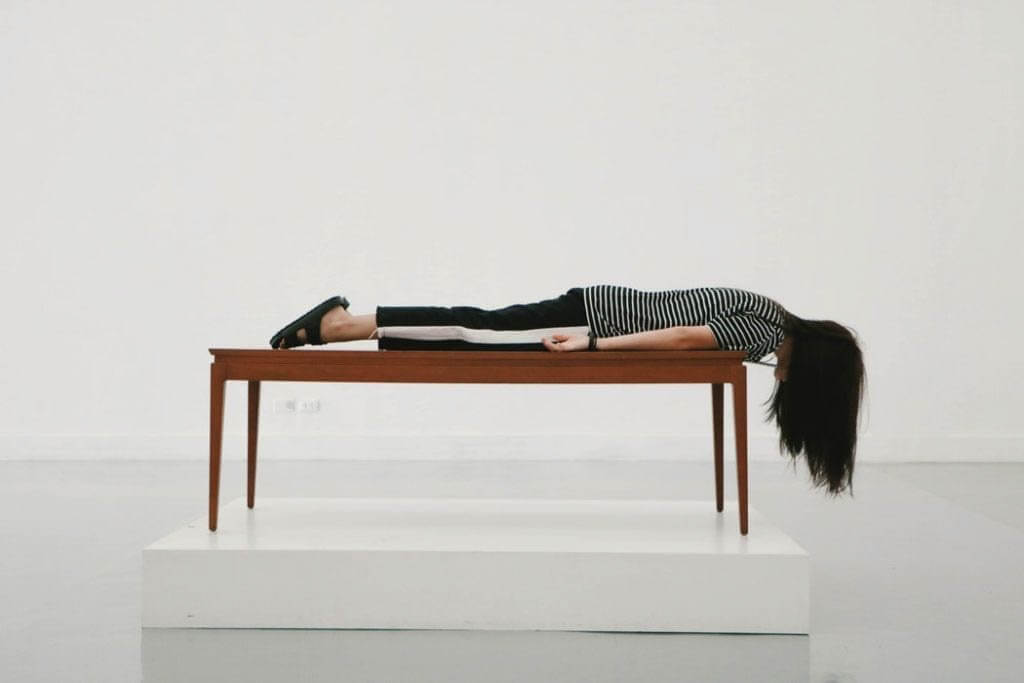
Inhaltsverzeichnis
No more on constant stress? 5 exercises that now help you to go through life more relaxed
When was the last time you truly enjoyed your coffee? Consciously perceived the aroma, felt the warmth on your hands, and simply surrendered to the taste?
With these stress-relieving exercises, you can not only relax but also become more aware of your surroundings and appreciate the little moments in life more.
The problem
The thought "I don't know how I'm going to manage all this" has become a habit for many of us, and we believe we'll never get everything done. We've just checked off two items on our to-do list and three more appear. The feeling of never really getting anything done causes us to do the "unimportant" things that need to be done every day as a side job. We want to get laundry, tidying up, brushing teeth, and even eating out of the way as quickly as possible so we can focus on more important things.
When we finally have a bit of breathing room, we flop down on the couch in front of the TV or our smartphone and let whatever comes our way wash over us. This isn't meant to be a socially critical "stop consuming so much" post, but rather a post to show you that with a little more awareness and focused attention, we can escape the vicious cycle of constant stress – without procrastinating or pushing away our responsibilities. If we use a few tools and habits to become more conscious of how we structure our days and learn to enjoy the whole process instead of constantly thinking about what we have to do today, this can lead to us not only feeling happier and more relaxed in the long run, but also being more productive.
But how is that supposed to work?

Photo by Natalia Figueredo on Unsplash
The solution
The magic word here is Mindfulness. Especially in the last two or three years, you've been hearing the term more and more often; it seems like it's being thrown at you everywhere. If you're thinking, "I can save myself all that spiritual nonsense, it's just another trend anyway," I can reassure you that this is probably the first thought of most people who come into contact with this topic. I was also very skeptical and prejudiced at first, but—spoiler alert—it's one of the things that has changed my life the most in recent years.
So, what exactly is mindfulness and how can it make a difference in our lives?
Mindfulness originates from Buddhism; it's a very ancient practice that, after about 2,500 years, is slowly making its way into the modern, Western world. It aims at the "conscious, non-judgmental experience of currently perceivable subjective experience." That's all well and good, but what exactly does that mean? Mindfulness is something like the antithesis of the "autopilot mode" we so often find ourselves in. This means we are consciously aware of what we think, what we do, and how we feel, but WITHOUT immediately judging our experiences. We adopt a kind of observer perspective and focus on the present moment, what is happening right now, here and now.
Mindfulness is understood as a personal “attitude to life,” but that doesn’t mean that the best thing to do is just sit on your bed all the time and observe your thoughts (a shame, really…).It simply means becoming a little more aware of why you're doing something and what's happening around you. I'll tell you more about the benefits and long-term effects of mindfulness in another blog post soon.
First, I'd like to show you 5 stress-busting exercises that will help you distance yourself from your racing thoughts, relax in a few moments, and get out of autopilot mode.
Exercises against stress and for more serenity
1. Just take a deep breath
Sounds cliché, and it is. But it can help SO MUCH. Taking a few deep breaths through the nose and exhaling through the mouth not only supplies our body with fresh oxygen but also allows us to relax in a very short time. Breathing is the best tool for quickly returning to the present moment. As you breathe, consciously notice how your belly rises as you inhale and contracts as you exhale.

Photo by Eli DeFaria on Unsplash
2. The 54321 exercise
I personally love this exercise because it doesn't take long, it's a bit of a distraction and a pick-me-up, and it's even fun because you can do it again and again. No matter where you are, give it a try!
Take a deep breath and then find in your surroundings
- 5 things you can see
(z.B. Table, coffee cup, window, jacket, headphones) - 4 things you can feel
(z.B. Forearm on my thigh, hair on my shoulders, chair back against my back, a slightly stabbing headache) - 3 things you can hear
(z.B. Music from loudspeakers, people's voices, typing sounds on a keyboard) - 2 things you can smell
(z.B. the smell of coffee, the perfume of the person next to me) - 1 thing you can taste
(even if you are not eating or drinking anything, you always have a taste in your mouth – just notice it)
You can also vary the exercise by consciously paying attention to what you can perceive through your senses, no matter what you're doing. What can you feel, see, smell, and hear while you're showering? While you're washing up? While you're on your way to work?
3. Gratitude
List three things you are grateful for right now. These can be general things like your health, or having a roof over your head, or having running water. But also smaller things like being grateful that your little child smiled back at you earlier, or being able to choose which song you want to listen to next. It can be material things like your clothes or your smartphone, or intangible things like your friends or being grateful that you can run. Gratitude helps you refocus on everything you already have, instead of what you think you don't have or what isn't working so well right now. We all have so much to be grateful for, and reminding yourself of this every now and then helps you immediately put yourself in a better mood.
4.Eyes closed, head open
Close your eyes for a few moments and listen to yourself. What are you thinking about? What are you feeling? How are you feeling right now? When we focus on ourselves and our sensations and simply perceive what is happening for a moment, it often brings us clarity and helps us reconnect with ourselves. It's not about only perceiving the most positive impressions possible—if you're not feeling well right now, that's just the way it is. Simply notice what is.
5. Let go!
Try to gradually relax all your muscles. We often tense muscles without needing to. This causes us to tense up, and we signal to our body that there isn't any tension there. z.BI often tense the muscles around my eyes for no reason and only notice it after some time. So do your body good by really letting go. Relax your shoulders, your face, your jaw, your legs, your stomach... You'll quickly notice how good it feels.
These stress-busting exercises may seem insignificant at first glance, but they're by no means pointless. Since I've been doing these exercises and walking around more mindfully, I've noticed that I'm much more relaxed and don't immediately judge everything, but can also simply perceive what's happening before I act. So, I really recommend you give them a try.
Because you can only benefit from it – and you can’t really do anything wrong.
If you would like to learn more about mindfulness, healthy eating or sustainability, take a look here over.
What are your favorite stress-busting exercises? Let me know in the comments!

Photo by Roberto Nickson on Unsplash


























Leave a comment
This site is protected by hCaptcha and the hCaptcha Privacy Policy and Terms of Service apply.